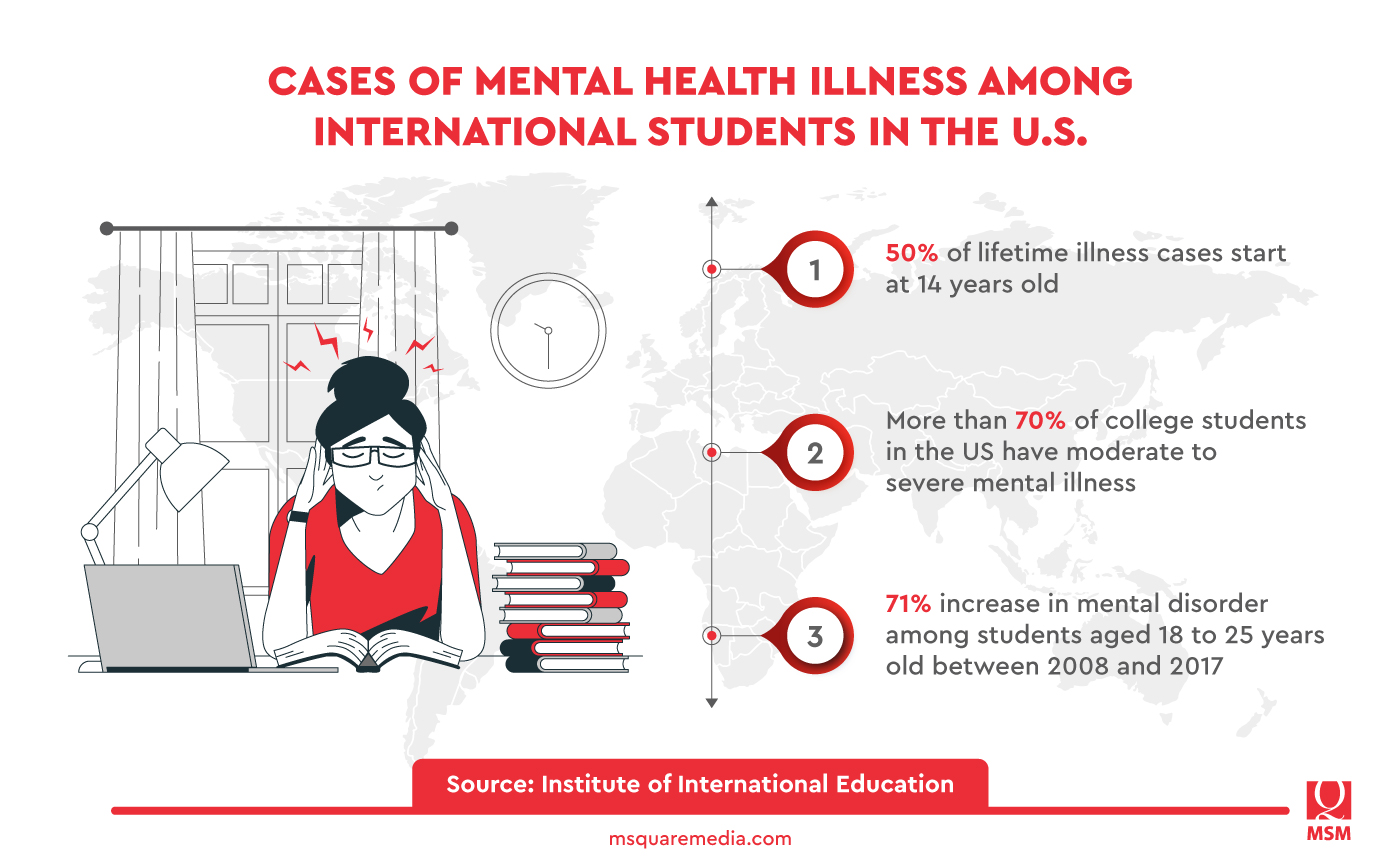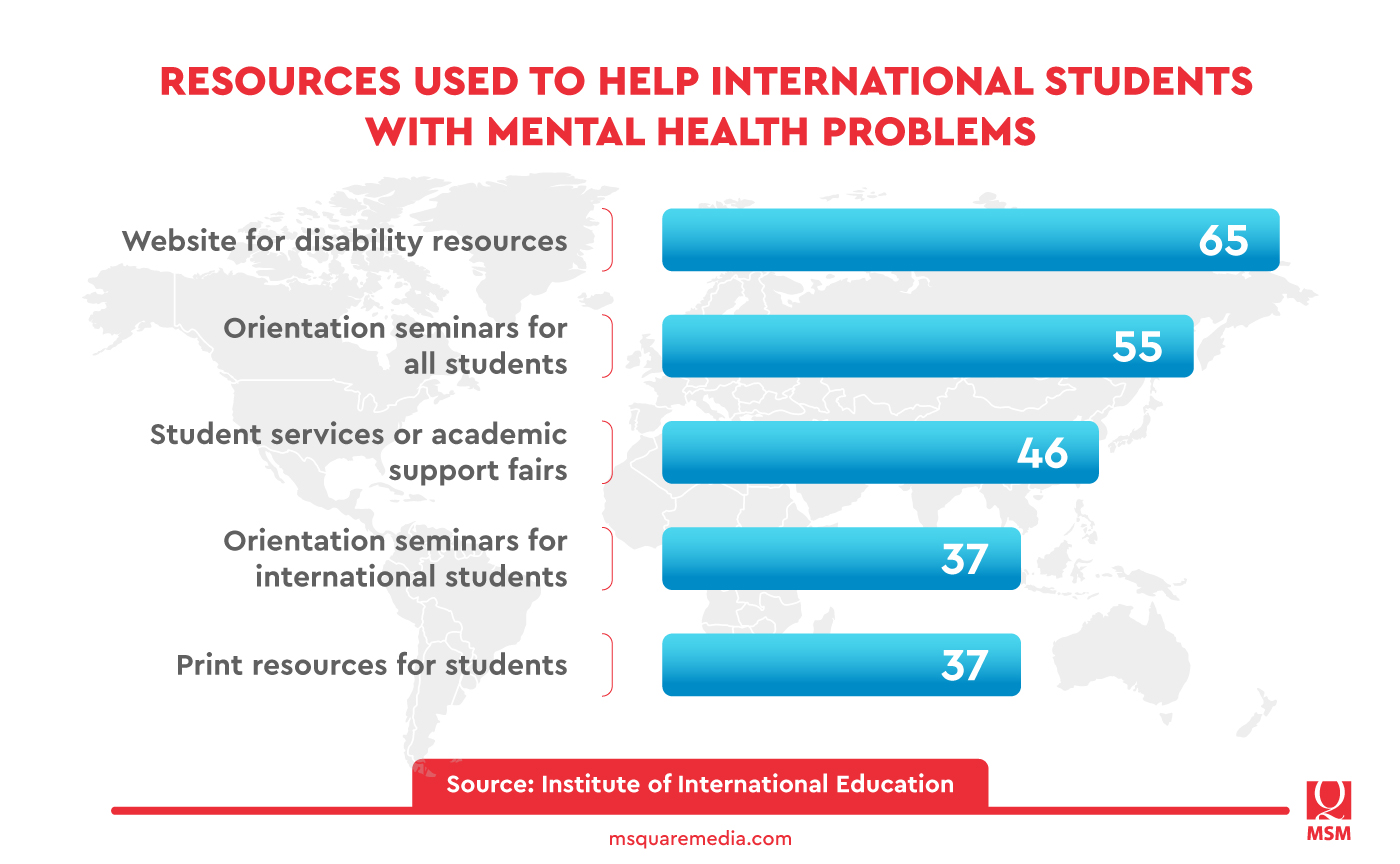Key Takeaways:
- The fact that 70% of students surveyed in U.S. colleges report experiencing moderate to severe psychological distress highlights the need for mental health care among students in overseas education programs.
- The mental health concerns of international students have intensified due to the COVID-19 pandemic, prompting educators to devise strategies to address them.
- Effectively supporting mental health in international education necessitates a multifaceted approach that centers on students, embraces innovation, and is attuned to individual needs.
The American international educational exchange sector has recently gained heightened awareness regarding the importance of mental health and overall well-being throughout the program cycle. The COVID-19 pandemic further accentuated the requirement for extensive support systems for both administrators and international students. The need to make mental health a top priority is widely recognized to ensure a positive and rewarding international education experience.
Mental Health Concerns Among International Students
The onset of mental health problems frequently coincides with the age range of students taking part in international student exchange programs. According to research by the Institute of International Education, 50% of lifetime cases of mental illness in the United States start at age 14 and rise to 75% by the age of 24. Furthermore, figures from recent studies indicate that more than 70% of students in U.S. colleges report experiencing moderate to severe psychological discomfort, such as stress, anxiety, and depression.
With a 71% increase in psychological distress among students aged 18 to 25 between 2008 and 2017, this concerning trend has been further worsened. While there are many factors that contribute to this increase, it is evident that mental health issues were prevalent within American higher education even before this global health crisis began.

Mental Health Challenges During the Pandemic
International students have faced certain difficulties as a result of the COVID-19 pandemic. A 2023 report highlights the mental health of international students during the 2020 pandemic, revealing that 84% of the surveyed students experienced “moderate-to-high” levels of stress. Notably, students who stayed in the host country during the pandemic endured higher stress due to COVID-19-related factors such as personal health concerns, a lack of social support, heightened perceived stress, and increased insomnia symptoms.
For international students who were away from home and their families during the first months of COVID-19, the rapidly changing and often conflicting information was very upsetting. These issues have urged educators and mental health specialists to offer suitable assistance to overseas students, especially those who choose to stay.
Need for Support
By highlighting the importance of a diverse approach, this recognizes that there isn’t a single answer that fits everyone’s journey to well-being. This emphasis is crucial, especially when considering how to support students from disadvantaged backgrounds, as it highlights how important it is to understand their distinctive challenges and experiences, which may not conform to societal norms.
By demonstrating a commitment to offering comprehensive care that genuinely supports all aspects of a student’s well-being, this relationship demonstrates a holistic and inclusive approach to mental health support.
Additionally, taking student input into account and acting on it can help tailor support to each individual’s requirements and preferences. For instance, one university that adopted a student-centered strategy changed an international student drop-in group’s structure and wording from a “therapy” group to a “support” group in response to student feedback. This improved engagement and helped students feel more at ease. It can be beneficial to be innovative and receptive to potential solutions for promoting mental health.

Numerous resources that institutions utilize to communicate with international students with mental health problems were noted in the Open Doors Report on International Students with Disabilities. Given that mental health or psychological disorders are the most common categories of declared disability for international students, more than half (55%) of the institutions that responded to the study offered information in an orientation session. This is an important first step. Other ways to share information with students included student services or academic support fairs (46%), print resources for students (37%), and websites for disability resources (65%).
Moving Forward
Observing how the landscape of mental health assistance in international education is changing is tremendously encouraging. A one-size-fits-all policy is clearly insufficient, so the comprehensive approach is stressed as a proactive step in meeting the varied requirements of students. This acknowledgment has a lot of potential, as it acknowledges the distinctive experiences of students from disadvantaged backgrounds and promotes a more open-minded and compassionate support network, especially for those kids.
By establishing these links, we not only improve mental health services but also foster an environment where each student’s journey is recognized and respected. This serves as a timely reminder that understanding, adaptability, and innovative solutions that address the needs of each individual’s well-being are necessary for advancement.
Let’s take inspiration from these encouraging developments as educators, mental health professionals, and institutions and keep advocating for a comprehensive strategy that enables every student to succeed, ensuring that their experience in international education is not only academically enriching but also emotionally fulfilling. (SUNEETHA QURESHI)

SUNEETHA QURESHI
MSM President
Suneetha has worked for 15 years in the international education sector and 25 years overall for her work for other industries. As president of MSM, she fortifies its business development outreach globally, particularly in the face of MSM’s foray into edtech-based recruitment via MSM Unify. She preserves the premium, value-adding services provided to each MSM partner institute, including dedicated teams on the ground, agent management, lead generation and inquiry management, application prescreening, and student and parent support through pioneering pre-departure briefing sessions.
She has an impeccable track record of successfully launching the representative offices in Asia and Africa of many North American and European higher education institutions. Her key strengths include hiring, training, and developing teams as evidenced by the successful results of the dedicated in-country college and university client teams.
Suneetha also has taken the lead in developing several initiatives at MSM, including building robust standard operating procedures, the Rise ‘n Shine team engagement platform, and the organization’s data analytics and audit segments.
Sources:
- ICEF Monitor. (2022, February 23). Survey finds majority of students struggling with mental health during COVID. ICEF Monitor. Retrieved from https://monitor.icef.com/2021/03/survey-finds-majority-of-students-struggling-with-mental-health-during-covid/
- Ingraham, S., & Mason, L. (2023). Institute of International Education. Mental Health and Well-Being in International Education. Retrieved from Institute of International Education website: https://www.iie.org/wp-content/uploads/2023/06/Mental-Health-and-Well-Being-in-International-Education_2023_for_website.pdf

